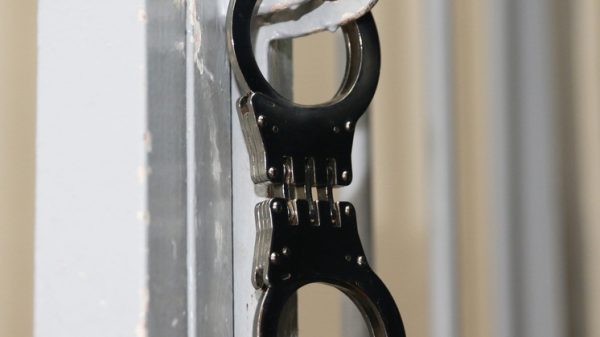 Julian Reichelt's online channel Nius has all the hallmarks of the American style of making self-confident news programs. Photo: Bernd von Jutrczenka/DPA
Julian Reichelt's online channel Nius has all the hallmarks of the American style of making self-confident news programs. Photo: Bernd von Jutrczenka/DPA
«We make a clear promise to you,» says Julian Reichelt, looking directly into the camera during his debut broadcast.
«On Nius.de, we will report what is really happening in Germany, starting from your point of view, through your eyes and above all for you… We are the voice of the majority.”
An opening monologue released earlier this month set the agenda for Nius, a new German media venture seeking to shake up what they see as the liberal orthodoxy of the establishment press.
The fledgling online channel marks the return of Reichelt, who has been fired from the post of editor of the German tabloid Bild after tasteless accusations of his affairs with younger colleagues.
More broadly, Nius is echoing the promise of GB News, the controversial channel launched in the UK two years ago as so-called «foxification» of news spreads across Europe.
François Godard, Analyst at Enders Analysis , says: «German news is notorious for being centrist, consensual and a bit boring, so you might think there's a chance to take it.»
Reichelt, 43. a summery Hamburger with thick-rimmed glasses seems to fit in with German media circles outwardly.
After making a name for himself as a war reporter, sending dispatches from Afghanistan and Iraq, Reichelt rose through the ranks. Bild, Germany's best-selling newspaper.
But since taking over as editor in 2017, Reichelt has forced change by shifting the tabloid sharply to the right, focusing on populist issues like immigration, and launching a bitter campaign against then Chancellor Angela Merkel.
 Germany's top-selling newspaper Bild, under Reichelt's leadership, was critical of the policies of then Chancellor Angela Merkel. Photo: Fabian Sommer/DPA
Germany's top-selling newspaper Bild, under Reichelt's leadership, was critical of the policies of then Chancellor Angela Merkel. Photo: Fabian Sommer/DPA
Reichelt's reputation as a tough taskmaster — he is known for sleeping on a military cot in his office — has been reinforced by the documentary Bild.Macht.Deutschland, which chronicles the daily lives of employees. in the newspaper.
But his fame soon turned into notoriety after a series of damning revelations in the New York Times about numerous affairs with young female colleagues, which led to accusations of abusing his position of power.
He denies sexual harassment and abuse of power, but does not deny relationships with younger staff.
After initially only surviving with a suspension, Reichelt was fired by Bild's parent company Axel Springer in late 2021.
The two parties are still in a legal battle due to allegations of that a former editor shared sensitive data with a rival publication. .
“His reputation in Germany is in the basement,” says Hendrik Zörner, a spokesman for the German Union of Journalists (DJV).
However, Axel Springer gave Reichelt a €2 million severance pay, as required by Germany’s strict labor laws. . With that money saved up, the outspoken journalist and commentator launched his new venture this month, Nius—pronounced «news.»
He enlisted the support of other high-profile figures in the German right-wing media and politics, including former Bild political editor Ralf Schuler and columnist Jan Fleischhauer.
“We want to take people seriously,” Nius editor-in-chief Jan David wrote. Zuthoff in a statement of purpose. «We want them to trust the media (again).»
«The topics that concern millions of Germans and influence their daily lives, but are too rarely covered elsewhere, will find their place in Nius.»
The title of the show is «Achtung, Reichelt!», the performance of the same name. a show hosted by a former Bild editor that first appeared as a YouTube channel.
In its early days, the channel focused on critical coverage of Olaf Scholz's coalition government, as well as skeptical views on immigration and climate change. .
Reichelt's frank texts and speeches have already caused controversy. Earlier this month, a Frankfurt court ruled against a journalist after he called Janka Kluge, a transgender woman, a man on his blog.
“What Julian Reichelt is trying to do here is classic tabloid journalism… Articles about Nius look like he wants to compete with the Bild-Zeitung,” says Zörner.
“The only unusual thing about Nius is this is his slogan: «Nius gives voice to the majority in Germany.» nonsense, of course.”
 Julian Reichelt's candid lyrics and speeches have caused controversy in Germany. Photo: Bernd von Yutchenka/DPA
Julian Reichelt's candid lyrics and speeches have caused controversy in Germany. Photo: Bernd von Yutchenka/DPA
In many ways, Reichelt's new venture carries all the hallmarks of the American style of self-confident news programming pioneered by Fox.
In the UK, GB News and Rupert Murdoch's TalkTV have emerged as new contenders, albeit with limited success to date. day. In France, media mogul Vincent Bolloret tried to imitate the genre with CNews.
With a low-budget, YouTube-style format, Nius certainly fits the bill. German journalists say it remains to be decided whether the startup is an attractive place to work, but Reichelt has already poached several big names.
Nius is unequivocally positioning Nius as a contender for the incumbent. giants of the German media world, opposing what he sees as an industry-wide omerta in covering certain topics.
One insider in the German media suggests that Reichelt's departure came after he became openly critical of Merkel, and it is no coincidence that he went against a deep-rooted consensus in the German media. the right person for this,” says Godard. “He has a somewhat Trumpian profile, starting with his alleged sex life. He also became addicted to populist news coverage.”
The former tabloid editor chose the moment wisely. In recent years, even greater divisions have arisen in German society, as voters have become disillusioned with the government and establishment institutions.
This was confirmed by a poll last month, which showed that 20% of Germans would vote for the extreme, the right-wing AfD party, known as a breeding ground for neo-Nazis. This is two percentage points higher than that of Chancellor Scholz's Social Democrats.
Recent incidents have exacerbated these divisions. Earlier this month, 26 police officers were injured in a mass brawl at an Eritrean festival in the town of Giessen, near Frankfurt.The far-right party AfD is gaining popularity among German voters. Photo: Ömer Messinger/Getty Images Europe
Another worrying trend is the recent spate of riots — including fights and sexual assaults — in outdoor swimming pools across Germany.
Nius seized on these incidents to promote critical views on immigration. On Twitter, Reichelt wrote: “We used to be afraid that the kids would drown in the pool. Now we fear that they will drown.”
Other questions will be more familiar to the British. Nius picked up a wave of dissatisfaction with the TV tax in Germany, called GEZ. At just over €18 a month, this is a mandatory fee that funds public broadcasting, the equivalent of a TV license in the UK.
Reichelt has often criticized Germany's state-run media, calling it «propaganda broadcasting» and blaming it for tax abolition.
In general, Reichelt tried to exploit the general feeling that the concerns of ordinary Germans are not reflected in the media and the political elite.
For some Analysts, Nius could be a launching pad for the implementation Reichelt's own political ambitions are similar to the rise to the top of the French politician Eric Zemmour, who became an expert and far right.
But whatever his long-term plans, it is clear that Reichelt has discovered a gap in the German media landscape and is determined to fill it its own brand of public opinion broadcasting. Whether he can repeat his success at Bild remains to be seen.


























































Свежие комментарии